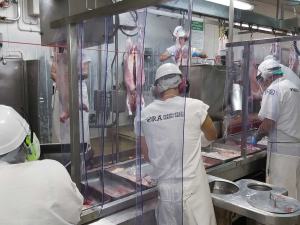M.I.A.
OPINION: The previous government spent too much during the Covid-19 pandemic, despite warnings from officials, according to a briefing released by the Treasury.
 The COVID-19 meat processing protocol has reduced the industry’s processing capacity by approximately 50% for sheep and 30% for cattle.
The COVID-19 meat processing protocol has reduced the industry’s processing capacity by approximately 50% for sheep and 30% for cattle.
Beef + Lamb New Zealand (BLNZ) and the Meat Industry Association (MIA) have released their latest assessment of processing capacity across the country.
The assessment also reveals the potential impact on waiting times for farmers due to COVID-19.
The COVID-19 meat processing protocol, which requires physical distancing between plant employees to prevent the spread of the virus, has reduced the industry’s processing capacity by approximately 50% for sheep and 30% for cattle.
• The assessment shows further delays in lamb processing in the South Island in April and May with processing being pushed back at least a further week. In essence, if farmers were expecting a four-week wait before the protocol, that would now be stretched to five weeks.
• By the end of May that extra week backlog should be cleared. In the North Island, the analysis does not forecast further delays on top of what farmers are currently experiencing.
• Lambs are being prioritised over cull ewes and farmer commentary is that significant backlogs on ewes also exist.
BLNZ and MIA say this is causing concern, particularly for those in drought areas with backlogs and also in the southern South Island – where there are longer waits, more stock on-farm than desirable and the grass growth season window rapidly closing.
B+LNZ’s Sam McIvor says the sector is aware there are already significant waits for some farmers.
“What this analysis sought to identify is what difference the processing reduction would make to that wait and the knock-on effects across species and islands.”
MIA’s Sirma Karapeeva says it is still early days with the new protocols, so the capacity figures may change.
She says processors and their people are bedding in the new way of working and are looking at ways to optimise their processing operations over the coming weeks to better manage demand.
“The meat processing sector is working with MPI to see whether there are science-supported changes that could be made to the protocol, particularly as we look out to Alert Level 3, that would allow an increase in throughput, while not compromising the safety of our people in any way,” she says.
Agriculture and Forestry Minister Todd McClay is encouraging farmers and growers to stay up to date with weather warnings and seek support should they need it.
The closure of SH2 Waioweka Gorge could result in significant delays and additional costs for freight customers around the Upper North Island, says Transporting New Zealand.
OPINION: The year has started positively for New Zealand dairy farmers and things are likely to get better.
Ministry for Primary Industries (MPI) Director General Ray Smith believes there is potential for an increase in dairy farming in New Zealand.
New Zealand's new Special Agricultural Trade Envoy, Horowhenua dairy farmer, company director and former Minister of Agriculture, Nathan Guy says the Free Trade Agreement (FTA) with India is a good deal for the country.
New figures show dairy farmers are not only holding on to their international workforce, but are also supporting those staff to step into higher-skilled roles on farm.